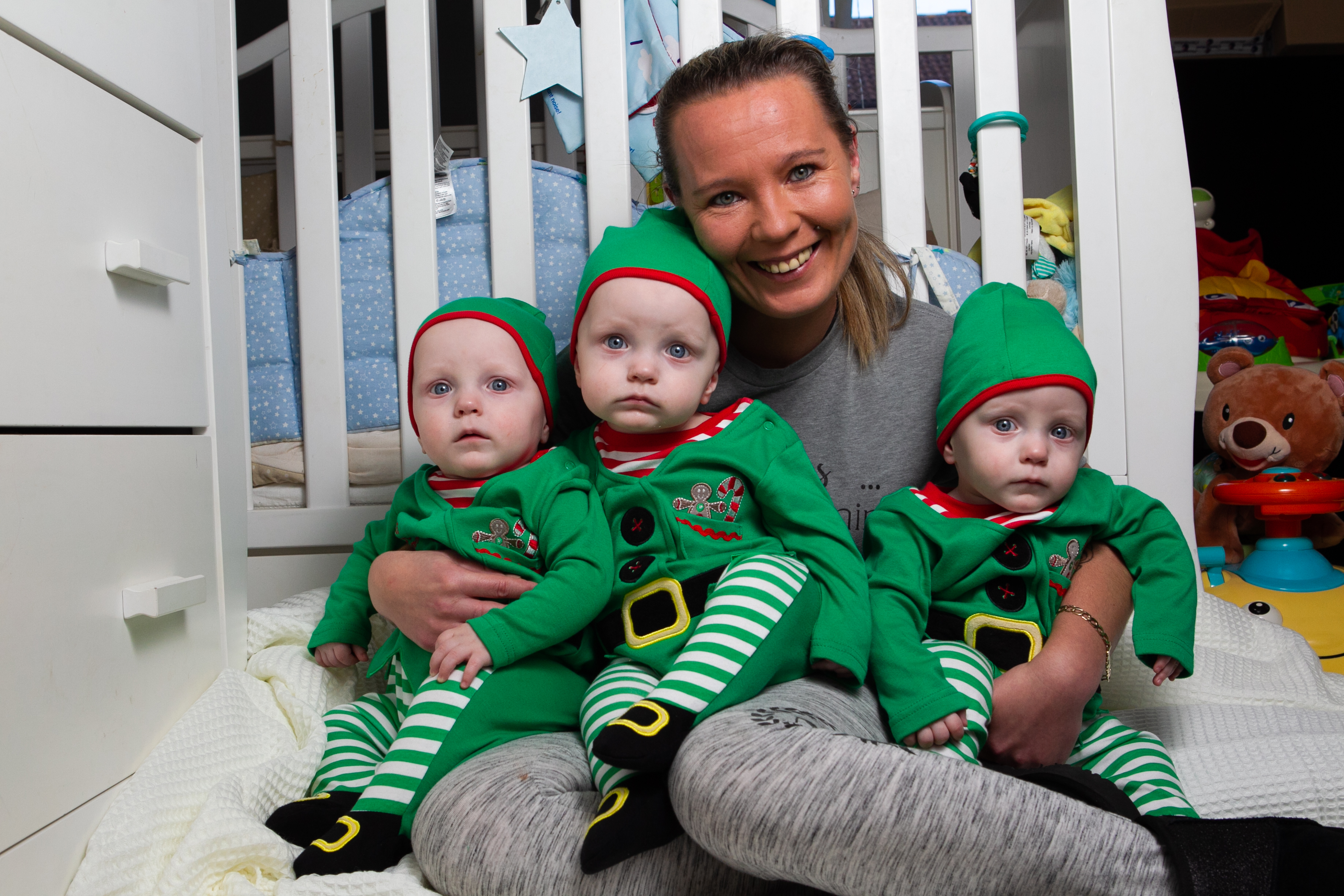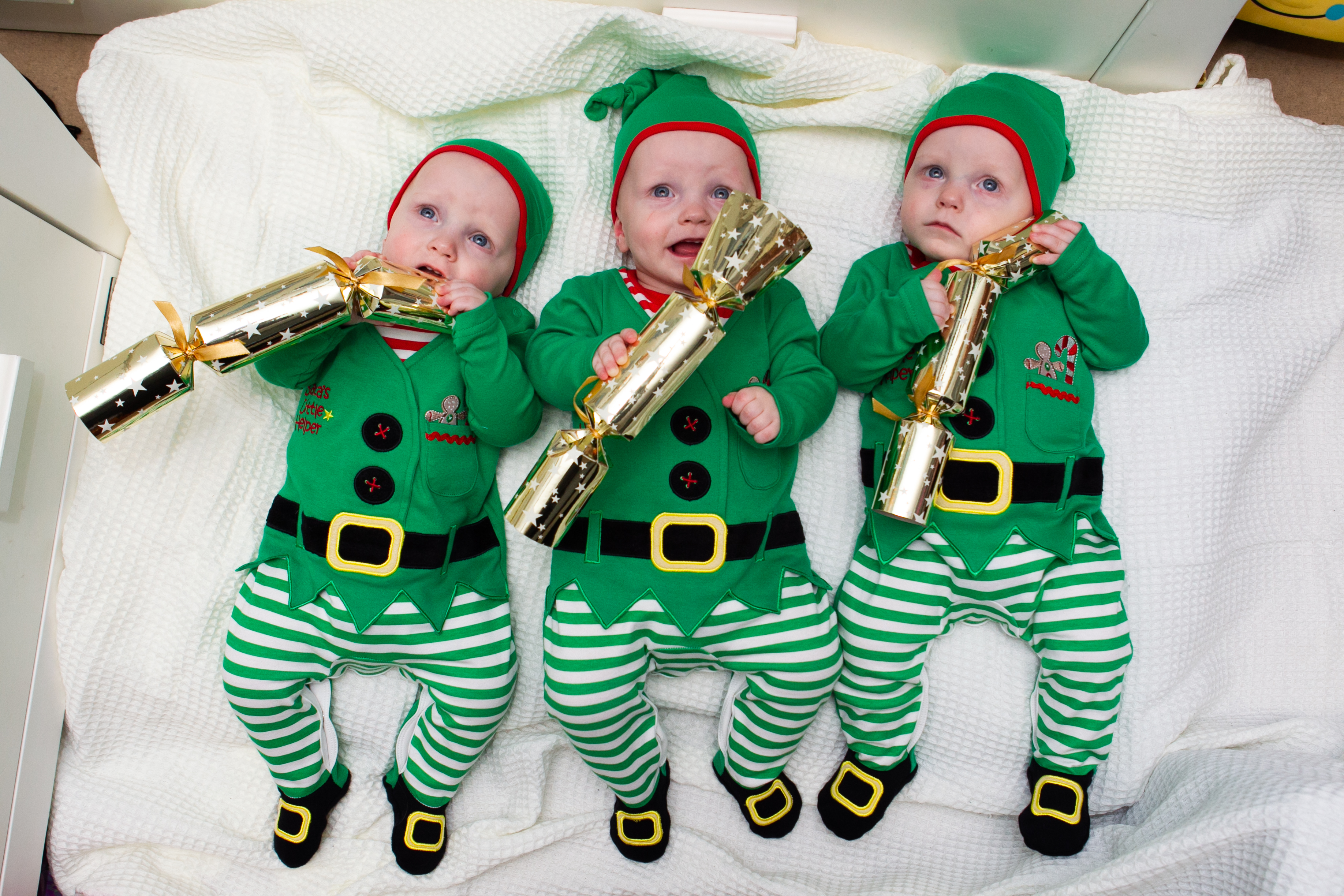
THERE’S no shortage of beautiful Christmas trees but proud mum Mary McCandlish has a beautiful Christmas three.
Her miracle triplets, Tomas, Tyler and Thai, spent their first weeks fighting for their lives in a baby intensive care unit.
The 14-month-old babies are now looking forward to their first Christmas at home.
It will be a big Christmas for Mary, of Barrhead in East Renfrewshire, as she already had four children before her triplets were born.
They were conceived naturally after Mary, 36, decided to have one last baby.
Mary said: “We spent last Christmas sitting around three little incubators watching the boys fight to survive.
“My triplets were born 10 weeks early by caesarean section after doctors decided it would be too risky for the pregnancy to continue.
“I am just five feet tall and felt I had done well to get to 30 weeks in pregnancy.
“The boys were running out of space in the womb and doctors wanted to give them the best chance to survive.
“Even when they were born the doctors couldn’t promise that they would all survive but they blossomed from the moment they took their first breath.”
Thai arrived weighing 3lb, Tyler 2lb and Tomas just 1lb.
After their very premature start to life the tiny triplet boys impressed doctors at the Queen Elizabeth University Hospital in Glasgow with their will to live.
When they were able to breathe on their own nursing staff reunited them in a super-sized incubator.
Their tiny hands reached out to grasp each other in the way they had done in the womb.
Earlier this year, after 10 weeks in hospital, the boys were allowed home to join their four big brothers and sisters.
Thai arrived home first, followed by Tyler and then Tomas.
Mary says she this will be the best Christmas ever for the family.
“It will be one of the busiest in any home in the country, I’ll bet. It will be filled with laughter and fun, the way any family’s should be.
“I don’t mind the hard work. What mum doesn’t want their house filled with kids, presents and fun on the best day of the year?
“The older kids will be playing with mobile phones and the like and the triplets will probably abandon their toys and want to play with the boxes.”
The bond between the triplets is a close one.
Mary says they only have to look at one another and they burst into fits of giggles.
If Tomas has a toy the other two will make a grab for it and the trio will erupt in laughter.
“They are either laughing or
tussling with each other,” says Mary.
Only one in 160,000 pregnancies result in identical triplets.
Mary’s older children – Peter, 17, Emily, 15, Katrina, 14, and James, seven – are delighted with their wee brothers.
And they don’t mind mucking in and helping, Mary reveals.
Having triplets in the family could either be a recipe for chaos or a master-
class in being a supermum.
“It helped that I managed to get into a routine as soon as the boys came home from hospital,” said Mary.
“They were sleeping from 9pm till 8am after a few weeks at home.
“Having had four children before certainly helped, but I think the key to coping with triplets is to be relaxed.
“If you are wound up and anxious, your babies will be too.”
Identical siblings are nature’s clones.
They are always the same gender but different only in fingerprints.
These are formed when babies press their fingers against the side of the womb or hold each other while developing during pregnancy.
The same gender is determined at conception, because identical twins come about when one fertilised egg splits into three.
Scientists believe that having identical twins or triplets may run in families.
Advances in intensive care have made survival better for the tiniest of premature babies.
But thriving from just 1lb in weight at birh has been a minor miracle for Tomas.
Their biggest challenge is getting the right amount of oxygenated blood to their brains to help prevent bleeds.
Too much oxygen can blind babies and too little can cause brain damage.

Enjoy the convenience of having The Sunday Post delivered as a digital ePaper straight to your smartphone, tablet or computer.
Subscribe for only £5.49 a month and enjoy all the benefits of the printed paper as a digital replica.
Subscribe